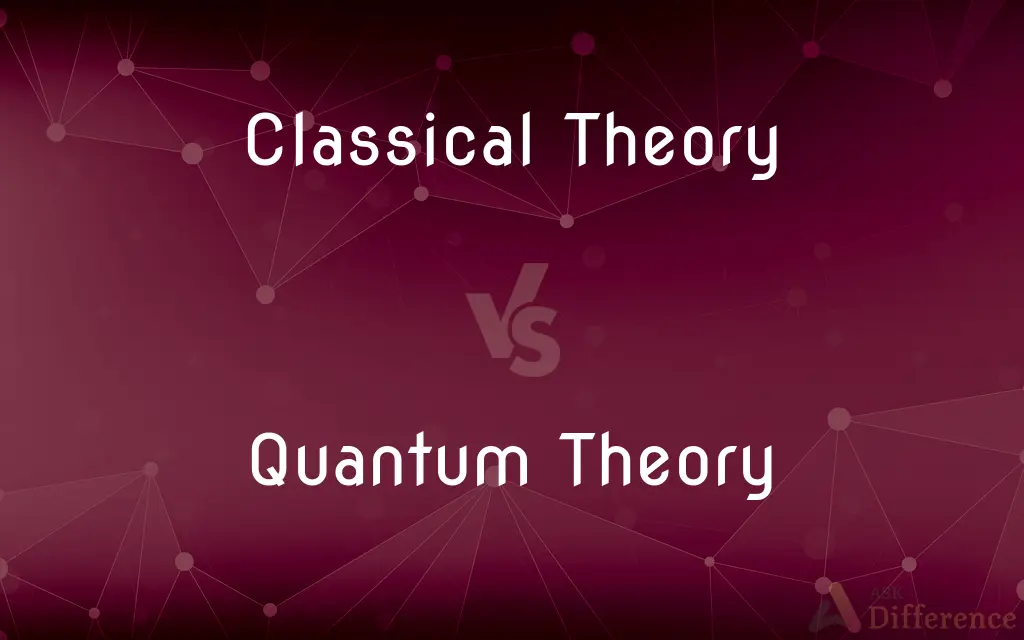Classical Theory vs. Quantum Theory — What's the Difference?
By Tayyaba Rehman — Published on November 18, 2023
Classical Theory describes the physics of everyday objects, while Quantum Theory describes the physics of tiny particles.

Difference Between Classical Theory and Quantum Theory
Table of Contents
ADVERTISEMENT
Key Differences
Classical Theory is a framework in physics that explains the behavior of matter and energy based on Newtonian mechanics. In this theory, objects move according to predictable laws, and measurements can be made with absolute certainty. Quantum Theory, on the other hand, is the branch of physics that describes the behavior of particles at the atomic and subatomic level. Within Quantum Theory, behaviors become probabilistic, and properties like position and momentum cannot be simultaneously measured with absolute precision.
Classical Theory provides a deterministic view of the universe where outcomes are certain given initial conditions. Quantum Theory introduces a degree of uncertainty, with outcomes being described by probability distributions rather than exact values. This difference between the two is fundamental and has led to groundbreaking insights into the nature of reality.
In the realm of Classical Theory, energy is continuous, and objects can take on any amount of energy. Quantum Theory, however, posits that energy is quantized, meaning it comes in discrete packets or "quanta." This concept led to the development of quantum mechanics, where the smallest particles, like electrons, can only have specific energy levels.
The understanding of light also diverges between Classical Theory and Quantum Theory. In the classical sense, light behaves as a wave, with properties like frequency and wavelength. However, Quantum Theory introduces the particle nature of light, identifying "photons" as the discrete packets of energy associated with light waves.
Comparison Chart
Nature of Reality
Deterministic; outcomes are certain
Probabilistic; outcomes are based on probability
ADVERTISEMENT
Energy
Continuous
Quantized; comes in discrete units
Behavior of Particles
Predictable laws of motion
Uncertainty principle in position and momentum
Description of Light
Wave nature
Dual nature; behaves as both wave and particle (photon)
Scale of Applicability
Macroscopic objects; everyday scales
Atomic and subatomic particles
Compare with Definitions
Classical Theory
A framework describing the physics of macroscopic objects.
The satellite's motion can be explained using Classical Theory.
Quantum Theory
Demonstrates the dual nature of light as both wave and particle.
Experiments like the double-slit experiment are explained using Quantum Theory.
Classical Theory
Describes phenomena where quantum effects are negligible.
When building a bridge, engineers use Classical Theory to calculate forces.
Quantum Theory
Introduces the concept of quantized energy levels.
The discrete lines in atomic spectra are explained by Quantum Theory.
Classical Theory
Assumes absolute measurements can be made.
In Classical Theory, the speed and position of a car can be measured simultaneously.
Quantum Theory
Central to modern technological advancements like semiconductors and lasers.
Quantum Theory is essential in the design of modern computer chips.
Classical Theory
Founded on Newtonian mechanics and determinism.
Using Classical Theory, we can predict a planet's orbit.
Quantum Theory
Describes the world in terms of probabilities and uncertainties.
Quantum Theory posits that you cannot know an electron's exact position and momentum simultaneously.
Classical Theory
Deals with continuous values like energy and position.
Classical Theory doesn't account for energy quantization as seen in atomic spectra.
Quantum Theory
A branch of physics explaining behavior at the atomic and subatomic level.
Quantum Theory has revolutionized our understanding of the atom.
Common Curiosities
What is the primary focus of Classical Theory?
Classical Theory primarily describes the physics of macroscopic objects based on Newtonian mechanics.
Are Classical Theory and Quantum Theory mutually exclusive?
No, Classical Theory can be seen as a special case of Quantum Theory when quantum effects are negligible.
What's the significance of the uncertainty principle in Quantum Theory?
It means you cannot simultaneously know a particle's exact position and momentum.
How does energy differ between Classical Theory and Quantum Theory?
In Classical Theory, energy is continuous, while in Quantum Theory, it is quantized.
How does Quantum Theory change our understanding of particles?
Quantum Theory introduces probabilistic behaviors and uncertainties at the atomic and subatomic levels.
Why was Quantum Theory developed?
To explain phenomena that couldn't be described by Classical Theory, especially at the atomic level.
Are there phenomena explained by Quantum Theory but not observed in the classical world?
Yes, phenomena like superposition and entanglement are exclusive to Quantum Theory.
Does Quantum Theory only apply to tiny particles?
While its primary domain is the small scale, Quantum Theory's principles can have macroscopic implications.
Can Classical Theory explain all physical phenomena?
No, it fails at atomic and subatomic scales where Quantum Theory becomes essential.
Can we use Classical Theory to design modern tech devices?
Some aspects might use Classical Theory, but advanced devices, especially in electronics, heavily rely on Quantum Theory.
Are there any real-world applications of Quantum Theory?
Yes, many modern technologies, like lasers, MRI scanners, and computer chips, are based on principles of Quantum Theory.
Why is light described differently in Classical Theory and Quantum Theory?
Classical Theory sees light as a wave, while Quantum Theory introduces its particle nature as photons.
Is gravity explained by Classical Theory or Quantum Theory?
Classical Theory, particularly General Relativity, describes gravity, but integrating it into Quantum Theory remains a challenge.
Which theory is older, Classical or Quantum?
Classical Theory is older, with roots in Newton's laws, while Quantum Theory emerged in the early 20th century.
How do Classical Theory and Quantum Theory view the nature of reality?
Classical Theory views it as deterministic, while Quantum Theory sees it as probabilistic.
Share Your Discovery

Previous Comparison
Slim Fit vs. Regular Fit
Next Comparison
Melancholy vs. SadnessAuthor Spotlight
Written by
Tayyaba RehmanTayyaba Rehman is a distinguished writer, currently serving as a primary contributor to askdifference.com. As a researcher in semantics and etymology, Tayyaba's passion for the complexity of languages and their distinctions has found a perfect home on the platform. Tayyaba delves into the intricacies of language, distinguishing between commonly confused words and phrases, thereby providing clarity for readers worldwide.
















































